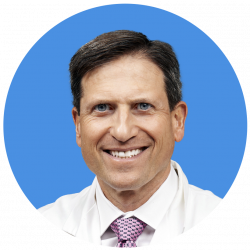I am NOT a naturopathic physician and did NOT attend a naturopathic medical college. (I attended Chicago Medical School, trained in general surgery at North Shore University Hospital, urology at University of Pennsylvania School of Medicine, and pursued a female urology and voiding dysfunction fellowship at UCLA School of Medicine.) I recently learned about naturopathy and the naturopathic principles of healing from an informative medical article. Interestingly and surprisingly, each of these six principles resonate and align strongly with my medical practice philosophy. In this entry I review the principles and how I interpret them and put them into practical use.
PRINCIPLES OF NATUROPATHIC HEALING
The Healing Power of Nature
Our bodies are capable of establishing, maintaining, and restoring health. The role of the physician is to facilitate and promote this process, supporting a healthy internal and external environment.
The best fortune cookie I ever received and that I quote to patients all the time is: “Nature, time, and patience are the three great physicians.” I have found in my practice that many issues will ultimately resolve spontaneously, so it is often worthwhile to give nature time to do its thing before pursuing costly diagnostic testing and/or active intervention.
Identify and Treat the Causes of the Disease
It is fundamental to address the underlying cause of an illness rather than just manage its symptoms. Managing symptoms alone without addressing the root cause can prove detrimental. Symptoms will most often be alleviated after the underlying cause of the problem is determined and treated.
This is basic and straightforward.
Do No Harm
Never allow the treatment to be worse or more harmful than the underlying illness.
My interpretation: “If it ain’t broke, don’t fix it, and if it is broke, don’t make it worse.”
Treat the Whole Person
Health and illness are conditions of one’s entire being that involve a complex interaction of underlying factors. Many causes of illness are multifactorial, including physical, psychological, emotional, spiritual, genetic, environmental, and social components. Often what starts out physical in origin may have psychological ramifications, and alternatively, what is psychological in origin may have physical ramifications, a testament to the profound mind-body connection. All factors must be considered in the treatment process.
My interpretation: As urologists, we are not just treating a patient’s urinary or genital tract and need to consider the illness or problem in the context of the entire human being and all the complexity involved as such.
Physician as Teacher
The word doctor is derived from the Latin verb “docere,” meaning to teach. An important role of the physician is to educate the patient to enable informed decisions.
I believe that “the best prescription is knowledge.” Patients come into the office frightened about their condition and under this circumstance will often forget some of the information that is relayed verbally, so I have found it helpful to give the patient written educational materials that I have composed over the years.
Prevention
The physician functions as a catalyst to promote health and empower and motivate the patient to assume responsibility for their own health, encouraging lifestyle habits that engender health and vitality. The fostering of health and the avoidance of risk and harm is as important or even more so than the treatment of disease.
Maintaining health in an unhealthy world is challenging, and physician and patient must collaborate to create a healthier internal and external environment in which to live and thrive.
One of my favorite lines that I quote to patients is: “Genes load the gun, but lifestyle pulls the trigger.”
 Back to Blog Homepage
Back to Blog Homepage
